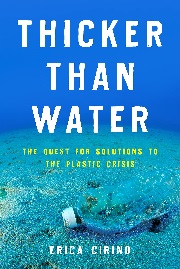Thicker Than Water: The Quest For Solutions To The Plastic Crisis

Erica Cirino
Island Press, £21.50
Decomposing plastic possesses a devilish, hydra-like quality: break it down and instead of disappearing it splits first into microplastic, then nanoplastic, and who knows what beyond. Vast amounts of this detritus now float in our rivers, our oceans, in the bellies of seabirds and fish, even in the air we breathe at home.
Inability to decompose may well be the central problem of plastic, but, as Erica Circino eloquently details in Thicker Than Water, to this we might add the sheer amount already produced. The prevalence of single use, throw-away culture, duplicitous corporate behaviour, the dirty and damaging process of creating plastic itself, as well as the local and global inequities sustained by those who end up shouldering the ecological burden of other people’s rubbish.
This book goes beyond your standard facts-and-figures outline of an industry, weaving personal tales of sailing through the Great Pacific Garbage Patch with stories of those communities bearing the brunt of plastic production from around the world. In its most powerful moments, a sense of scale and irreversibility is conveyed that borders on the utterly hopeless.
Unfortunately, for both the book and more importantly the planet, the ‘quest for solutions’ in the subtitle remains an un-fulfilled one. Algae that eat plastic are one thing, but who, institutionally and world-wide, will stand up to big oil (already banking on being able to switch production to plastic to stave off fuel loses)? Who will restrict the lobbyists from watering down legislation and the PR firms spreading more myths about recycling? Who will solve a problem whose origin is found in greed and convenience?
D. Cornish


